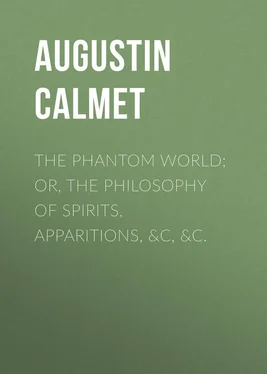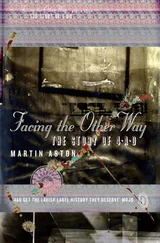Augustin Calmet - The Phantom World; or, The philosophy of spirits, apparitions, &c, &c.
Здесь есть возможность читать онлайн «Augustin Calmet - The Phantom World; or, The philosophy of spirits, apparitions, &c, &c.» — ознакомительный отрывок электронной книги совершенно бесплатно, а после прочтения отрывка купить полную версию. В некоторых случаях можно слушать аудио, скачать через торрент в формате fb2 и присутствует краткое содержание. Жанр: foreign_antique, foreign_prose, на английском языке. Описание произведения, (предисловие) а так же отзывы посетителей доступны на портале библиотеки ЛибКат.
- Название:The Phantom World; or, The philosophy of spirits, apparitions, &c, &c.
- Автор:
- Жанр:
- Год:неизвестен
- ISBN:нет данных
- Рейтинг книги:3 / 5. Голосов: 1
-
Избранное:Добавить в избранное
- Отзывы:
-
Ваша оценка:
- 60
- 1
- 2
- 3
- 4
- 5
The Phantom World; or, The philosophy of spirits, apparitions, &c, &c.: краткое содержание, описание и аннотация
Предлагаем к чтению аннотацию, описание, краткое содержание или предисловие (зависит от того, что написал сам автор книги «The Phantom World; or, The philosophy of spirits, apparitions, &c, &c.»). Если вы не нашли необходимую информацию о книге — напишите в комментариях, мы постараемся отыскать её.
The Phantom World; or, The philosophy of spirits, apparitions, &c, &c. — читать онлайн ознакомительный отрывок
Ниже представлен текст книги, разбитый по страницам. Система сохранения места последней прочитанной страницы, позволяет с удобством читать онлайн бесплатно книгу «The Phantom World; or, The philosophy of spirits, apparitions, &c, &c.», без необходимости каждый раз заново искать на чём Вы остановились. Поставьте закладку, и сможете в любой момент перейти на страницу, на которой закончили чтение.
Интервал:
Закладка:
The antiquity of these opinions touching the corporality of angels appears in several old writers, who, deceived by the apocryphal book which passes under the name of the Book of Enoch , have explained of the angels what is said in Genesis, 60 60 Gen. vi. 2.
" That the children of God, having seen the daughters of men, fell in love with their beauty, wedded them, and begot giants of them. " Several of the ancient Fathers 61 61 Joseph. Antiq. lib. i. c. 4. Philo, De Gigantibus. Justin. Apol. Turtul. de Animâ. Vide Commentatores in Gen. iv.
have adopted this opinion, which is now given up by everybody, with the exception of some new writers, who desire to revive the idea of the corporality of angels, demons, and souls – an opinion which is absolutely incompatible with that of the Catholic church, which holds that angels are of a nature entirely distinct from matter.
I acknowledge that, according to their system, the affair of apparitions could be more easily explained; it is easier to conceive that a corporeal substance should appear, and render itself visible to our eyes, than a substance purely spiritual; but this is not the place to reason on a philosophical question, on which different hypotheses could be freely grounded, and to choose that which should explain these appearances in the most plausible manner, even though it answer in the most satisfactory manner the question asked, and the objections formed against the facts, and against the proposed manner of stating them.
The question is resolved, and the matter decided. The church and the Catholic schools hold that angels, demons, and reasonable souls, are disengaged from all matter; the same church and the same school hold it as certain that good and bad angels, and souls separated from the body, sometimes appear by the will and with the permission of God: there we must stop; as to the manner of explaining these apparitions, we must, without losing sight of the certain principle of the immateriality of these substances, explain them according to the analogy of the Christian and Catholic faith, acknowledged sincerely that in this matter there are certain depths which we cannot sound, and confine our mind and information within the limits of that obedience which we owe to the authority of the church, that can neither err nor deceive us.
The apparitions of good angels and of guardian angels are frequently mentioned in the Old as in the New Testament. When the Apostle St. Peter had left the prison by the assistance of an angel, and went and knocked at the door where the brethren were, they believed that it was his angel and not himself who knocked. 62 62 Acts xii. 15.
And when Cornelius the Centurion prayed to God in his own house, an angel (apparently his good angel) appeared to him, and told him to send and fetch Peter, who was then at Joppa. 63 63 Acts x. 2, 3.
St. Paul desires that at church no woman should appear among them without her face being veiled, because of the angels; 64 64 1 Cor. xi. 10.
doubtless from respect to the good angels who presided in these assemblies. The same St. Paul reassures those who were with him in danger of almost inevitable shipwreck, by telling them that his angel had appeared to him 65 65 Acts xxvii. 21, 22.
and assured him that they should arrive safe at the end of their voyage.
In the Old Testament, we likewise read of several apparitions of angels, which can hardly be explained but as of guardian angels; for instance, the one who appeared to Hagar in the wilderness, and commanded her to return and submit herself to Sarah her mistress; 66 66 Gen. xvi. 9.
and the angel who appeared to Abraham, as he was about to immolate Isaac his son, and told him that God was satisfied with his obedience; 67 67 Gen. xxii. 11, 17.
and when the same Abraham sent his servant Eleazer into Mesopotamia, to ask for a wife for his son Isaac, he told him that the God of heaven, who had promised to give him the land of Canaan, would send his angel 68 68 Gen. xxiv. 7.
to dispose all things according to his wishes. Examples of similar apparitions of tutelary angels, derived from the Old Testament, might here be multiplied, but the circumstance does not require a greater number of proofs.
Under the new dispensation, the apparitions of good angels, of guardian spirits, are not less frequent in most authentic stories; there are few saints to whom God has not granted similar favors: we may cite, in particular, St. Frances, a Roman lady of the sixteenth century, who saw her guardian angel, and he talked to her, instructed her, and corrected her.
CHAPTER V.
OPINION OF THE GREEKS AND ROMANS ON THE APPARITIONS OF GOOD GENII
Jamblichus, a disciple of Porphyry, 69 69 Jamblic. lib. ii. cap. 3 & 5.
has treated the matter of genii and their apparition more profoundly than any other author of antiquity. It would seem, to hear him discourse, that he knew both the genii and their qualities, and that he had with them the most intimate and continual converse. He affirms that our eyes are delighted by the appearance of the gods, that the apparitions of the archangels are terrible; those of angels are milder; but when demons and heroes appear, they inspire terror; the archontes, who preside over this world, cause at the same time an impression of grief and fear. The apparition of souls is not quite so disagreeable as that of heroes. In the appearance of the gods there is order and mildness, confusion and disorder in that of demons, and tumult in that of the archontes.
When the gods show themselves, it seems as if the heavens, the sun and moon, were all about to be annihilated; one would think that the earth could not support their presence. On the appearance of an archangel, there is an earthquake in every part of the world; it is preceded by a stronger light than that which accompanies the apparition of the angels; at the appearance of a demon it is less strong, and diminishes still more when it is a hero who shows himself.
The apparitions of the gods are very luminous; those of angels and archangels less so; those of demons are dark, but less dark than those of heroes. The archontes, who preside over the brightest things in this world, are luminous; but those which are occupied only with what is material, are dark. When souls appear, they resemble a shade. He continues his description of these apparitions, and enters into tiresome details on the subject; one would say, to hear him, that that there was a most intimate and habitual connection between the gods, the angels, the demons, and the souls separated from the body, and himself. But all this is only the work of his imagination; he knew no more than any other concerning a matter which is above the reach of man's understanding. He had never seen any apparitions of gods or heroes, or archontes; unless we say that there are veritable demons which sometimes appear to men. But to discern them one from the other, as Jamblichus pretends to do, is mere illusion.
The Greeks and Romans, like the Hebrews and Christians, acknowledged two sorts of genii, some good and beneficent, the others bad, and causing evil. The ancients even believed that every one of us received at our birth a good and an evil genius; the former procured us happiness and prosperity, the latter engaged us in unfortunate enterprises, inspired us with unruly desires, and cast us into the worst misfortunes. They assigned genii, not only to every person, but also to every house, every city, and every province. 70 70 "Quod te per Genium, dextramque Deosque Penates, Obsecro et obtestor." — Horat . lib. i. Epist. 7. 94. – "Dum cunctis supplex advolveris aris, Ei mitem Genium Domini præsentis adoras." Stac . lib. v. Syl. I. 73.
These genii are considered as good, beneficent, 71 71 Antiquitée expliquée, tom. i.
and worthy of the worship of those who invoke them. They were represented sometimes under the form of a serpent, sometimes as a child or a youth. Flowers, incense, cakes, and wine were offered to them. 72 72 Perseus, Satire ii.
Men swore by the names of the genii. 73 73 Senec. Epist. 12.
It was a great crime to perjure one's self after having sworn by the genius of the emperor, says Tertullian; 74 74 Tertull. Apol. c. 23.
Citius apud vos per omnes Deos, quàm per unicum Genium Cæsaris perjuratur.
Интервал:
Закладка:
Похожие книги на «The Phantom World; or, The philosophy of spirits, apparitions, &c, &c.»
Представляем Вашему вниманию похожие книги на «The Phantom World; or, The philosophy of spirits, apparitions, &c, &c.» списком для выбора. Мы отобрали схожую по названию и смыслу литературу в надежде предоставить читателям больше вариантов отыскать новые, интересные, ещё непрочитанные произведения.
Обсуждение, отзывы о книге «The Phantom World; or, The philosophy of spirits, apparitions, &c, &c.» и просто собственные мнения читателей. Оставьте ваши комментарии, напишите, что Вы думаете о произведении, его смысле или главных героях. Укажите что конкретно понравилось, а что нет, и почему Вы так считаете.












